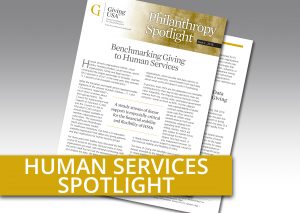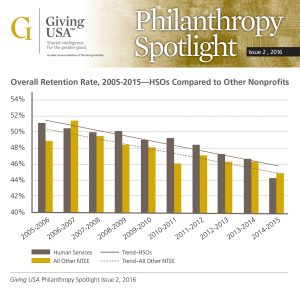 Human Services organizations (HSOs)—food banks, homeless shelters, youth services, sports organizations, family and legal services—are the organizations that many people think of when they think about the nonprofit sector. In 2014, HSOs constituted the largest percentage of all public charities (35.5 percent), but they received 11.7 percent of all charitable contributions.
Human Services organizations (HSOs)—food banks, homeless shelters, youth services, sports organizations, family and legal services—are the organizations that many people think of when they think about the nonprofit sector. In 2014, HSOs constituted the largest percentage of all public charities (35.5 percent), but they received 11.7 percent of all charitable contributions.
While some well-known HSOs are large and well-funded, the majority fly below the radar, delivering needed services in individual communities. However, like many other nonprofits, most HSOs have no idea how to find reliable data on fundraising that they can use to benchmark their performance. In other subsectors, such as healthcare and education, data and research on giving are relatively easy to find, but for HSOs there is no obvious analogue: most have little sense of how other organizations attract donations.
Until now, the nonprofit sector has lacked a national dataset that could be used to create fundraising benchmarks or to compare organizations across or within subsectors. In 2012, the Association of Fundraising Professionals, the Urban Institute’s Center on Nonprofits and Philanthropy, and DonorPerfect launched the Growth in Giving (GIG) Initiative and began to form data-sharing partnerships with fundraising software firms such as Bloomerang, Neon, Abila, and others. Today, the GIG Initiative has capitalized on the vast amount of data collected by software firms on an ongoing basis to create a database that will help advance research, education, and public understanding of philanthropy.
The GIG Initiative’s unique data collection process allows donor software firms to contribute data on individual gift transactions without jeopardizing the confidentiality of any contributors or organizations. To date, software vendors have contributed data – including, when available, historical data from the past ten years – from over 6,000 client organizations. Dozens of key metrics of fundraising performance can be generated from just four gift-transaction data fields – Organization ID (anonymized), Donor ID (also anonymized), Date of Receipt and Amount of Gift – per transaction. The dataset also contains descriptive information about the organization’s subsector and location for most of the organizations in the database.
The GIG database currently contains more than 109 million gift transactions, including over 22 million individual donations to HSOs. Now, the Initiative, in partnership with Giving USA Foundation, has used data from the GIG database to produce the Giving USA Philanthropy Spotlight, “Benchmarking Giving to Human Services,” which reports on fundraising within HSOs. What we learn from the first analyses of the GIG data is that HSO’s have, since 2009, nearly caught up with other types of nonprofits in fundraising productivity. Giving increased at a slightly faster rate than contributions to non-HSOs (58.1 percent vs. 48.7 percent) in the period 2009-2015, which encompasses the recovery from the Great Recession. More strikingly, the average amount contributed per donor grew 70.7 percent for HSOs compared to 18.9 percent for non-HSO nonprofits over the same timeframe.
 The Giving USA Spotlight report also features a number of statistics widely used by professional fundraisers to compare HSOs and other nonprofits. These statistics include:
The Giving USA Spotlight report also features a number of statistics widely used by professional fundraisers to compare HSOs and other nonprofits. These statistics include:
- Contributions per donor
- Donors per organization
- Retention of current donors
- Acquisition of new donors
- Timing of contributions
The Giving USA Philanthropy Spotlight tells the story of how human services organizations have nearly caught up with other types of nonprofits in fundraising productivity, and shows how HSOs can use their own data to learn how to thrive and how to grow. The report also gives us a first look at the possibilities for actionable research that the GIG database provides.
The Giving USA Philanthropy Spotlight, “Benchmarking Giving to Human Services” is now available to download for $19.95 at www.givingusa.org.
About the authors: This post was written by the Spotlight co-authors: Nathan Dietz, Senior Research Associate, Center on Nonprofits and Philanthropy at the Urban Institute, and Kimberly Hawkins, Giving USA Foundation and Retired Senior Consultant and Principal, Marts & Lundy.
Read official press release.


